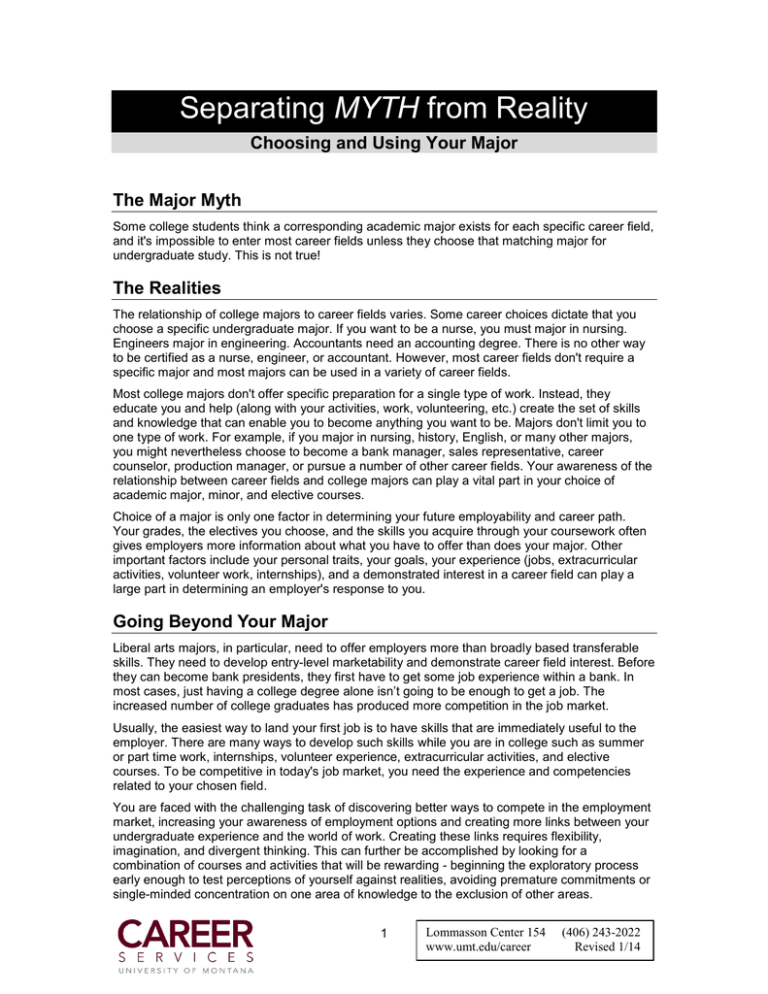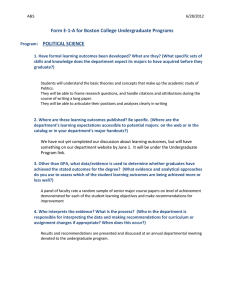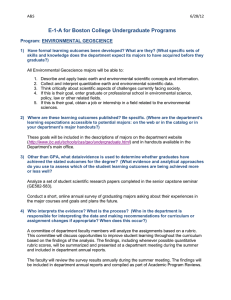MYTH Choosing and Using Your Major The Major Myth
advertisement

Separating MYTH from Reality Choosing and Using Your Major The Major Myth Some college students think a corresponding academic major exists for each specific career field, and it's impossible to enter most career fields unless they choose that matching major for undergraduate study. This is not true! The Realities The relationship of college majors to career fields varies. Some career choices dictate that you choose a specific undergraduate major. If you want to be a nurse, you must major in nursing. Engineers major in engineering. Accountants need an accounting degree. There is no other way to be certified as a nurse, engineer, or accountant. However, most career fields don't require a specific major and most majors can be used in a variety of career fields. Most college majors don't offer specific preparation for a single type of work. Instead, they educate you and help (along with your activities, work, volunteering, etc.) create the set of skills and knowledge that can enable you to become anything you want to be. Majors don't limit you to one type of work. For example, if you major in nursing, history, English, or many other majors, you might nevertheless choose to become a bank manager, sales representative, career counselor, production manager, or pursue a number of other career fields. Your awareness of the relationship between career fields and college majors can play a vital part in your choice of academic major, minor, and elective courses. Choice of a major is only one factor in determining your future employability and career path. Your grades, the electives you choose, and the skills you acquire through your coursework often gives employers more information about what you have to offer than does your major. Other important factors include your personal traits, your goals, your experience (jobs, extracurricular activities, volunteer work, internships), and a demonstrated interest in a career field can play a large part in determining an employer's response to you. Going Beyond Your Major Liberal arts majors, in particular, need to offer employers more than broadly based transferable skills. They need to develop entry-level marketability and demonstrate career field interest. Before they can become bank presidents, they first have to get some job experience within a bank. In most cases, just having a college degree alone isn’t going to be enough to get a job. The increased number of college graduates has produced more competition in the job market. Usually, the easiest way to land your first job is to have skills that are immediately useful to the employer. There are many ways to develop such skills while you are in college such as summer or part time work, internships, volunteer experience, extracurricular activities, and elective courses. To be competitive in today's job market, you need the experience and competencies related to your chosen field. You are faced with the challenging task of discovering better ways to compete in the employment market, increasing your awareness of employment options and creating more links between your undergraduate experience and the world of work. Creating these links requires flexibility, imagination, and divergent thinking. This can further be accomplished by looking for a combination of courses and activities that will be rewarding - beginning the exploratory process early enough to test perceptions of yourself against realities, avoiding premature commitments or single-minded concentration on one area of knowledge to the exclusion of other areas. 1 Lommasson Center 154 www.umt.edu/career (406) 243-2022 Revised 1/14 Asking the Right Questions When students are choosing a major, it is a good idea to focus on the broader career planning question of "What do I want to do?" This can lead you to self-reflect about who you are and explore career fields that provide opportunities for you to achieve what you want, not only from your college major, but from life as well. In attempting to answer what you want to do, you'll find that the choice of an academic major takes on new meaning. The search becomes one of finding the best academic program for your unique personality and chosen career goals. Evaluating the Majors/Careers You Are Considering New first-year students need adequate information about all that a college has to offer, and they need to know the requirements of the different programs of study. Just reading the college catalog isn't enough, and for the majority, exposure to a few subjects in high school simply won't serve to introduce or to interpret the college curriculum, which is a smorgasbord of specialization (and, often, of obscurity) by comparison. Before you can make a realistic decision about your major, you must take an informed look at all the possibilities. . . 1. You need information Information about YOU! a. About what you're Good at b. About what you're Interested in c. About what's Important to you Information about MAJORS & CAREERS! a. How Long will it take me to graduate? b. What kind of a GPA do I need to be accepted? c. What kind of Classes will I be taking? d. What type of Jobs can I get with the major? e. What is the job Outlook for this career? 2. You might need a REALITY CHECK a. b. c. d. e. Can I really expect to start with a $50,000.00 salary? I need to go to how many years of Graduate School? Who can I talk to or job shadow who already does this job? Will my major provide me with Internship opportunities? Is there volunteer work I could do to see if I like the job? Where to Go For Help Your high school guidance counselor Your college academic advising center Your college career services center Your college professors Professionals working in careers of interest to you Portions of this reference guide were adapted with permission of University Career Services at the University of Virginia. 2 Lommasson Center 154 www.umt.edu/career (406) 243-2022 Revised 1/14


